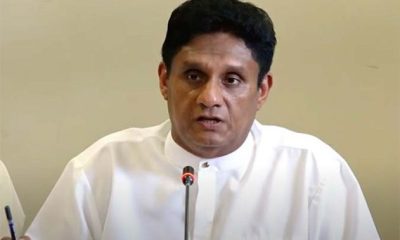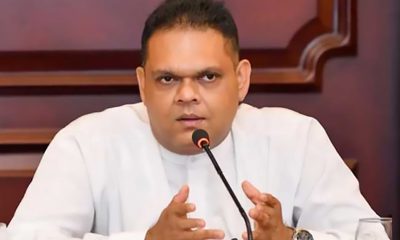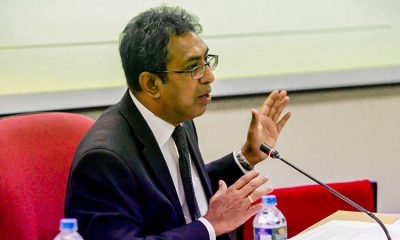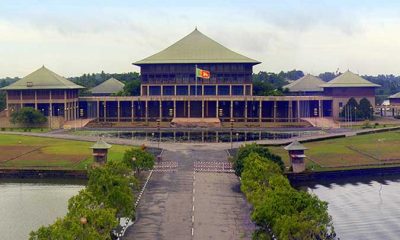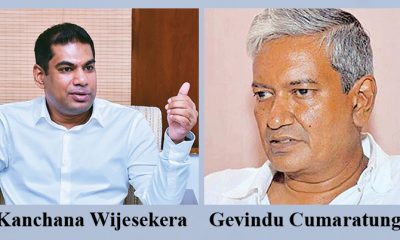News
Opposition asks Speaker to withdraw his ruling on motions passed by Parliament

By Saman Indrajith
Opposition political parties yesterday (11) demanded that Speaker Mahinda Yapa Abeywardena withdraw his ruling that courts are not empowered to issue orders or judgements of any nature related to a motion already passed by the Parliament.
On 09 August, the Speaker gave the ruling after Tourism and Lands Minister Harin Fernando raised a privilege issue on petitions filed against the resolution on domestic debt restructuring that had been approved by the House.
Opposition MPs urged the Speaker to withdraw this ruling as it violates standing orders, creates tension between the court and Parliament and undermines the Constitution.However, the Speaker insisted that he will not withdraw his ruling.
JVP-led NPP leader Anura Kumara Dissanayake: “According to standing orders, we can’t question the decisions of the Speaker. However, given that the Speaker’s rulings become a precedent in Parliament, we need to have serious discussions about these.
“On 09 August you told Parliament that since the Parliament has passed a motion on domestic debt restructuring, the court can’t issue orders or judgements of any nature against a resolution already passed by the Parliament.
“The Speaker said this in the morning, the court was to make a ruling on a case filed against restructuring of EPF funds a few hours later. The Speaker could have made a ruling later if there had been an issue with the court ruling. Also, your ruling is wrong.
“What are motions presented in Parliament? The Constitution has named the kind of motions we can have, one is a no-confidence motion, and the President can also have a motion to seek the opinion of the public on a matter of national importance. These are the two types of motions listed in the Constitution.
“When the government presents the Budget, we vote on the appropriation Bill. This is a law. People have the right to go before the court before it goes to Parliament. The Bill comes to Parliament through the courts. If Parliament passes a motion, and in line with tax laws and financial laws must be amended. The motions therefore fulfill a certain duty. I would like to know if the motion to subject EPF funds to domestic debt
restructuring was a law. Is it a draft law? Is it a regulation? Not at all. It was just a motion presented to Parliament. What is the standard procedure when we make laws? The court can determine if an act is consistent or inconsistent with the Constitution, but it can’t change an Act passed by Parliament.
“But here it was a resolution; it was not an Act. Tomorrow, a government MP presents a motion saying we must close all courts in the country. All government MPs will approve it. Then what? Can’t the court system examine that? Parliament can impose laws only after the court decides if they are consistent with the Constitution.
If we create a precedent where a government motion, once passed in Parliament can’t be examined by courts, that will be a terrible mistake. So, your ruling on 09 August sets a bad precedent. What will happen if the government starts passing motions that can’t be examined by courts? There is only one thing to do, you must take this directive back. Or you will create a crisis.”
SLFP Kurunegala District MP Dayasiri Jayasekera: “Article 91 of Standing Orders state that MPs must not talk about court cases that are before courts. If an MP starts talking about such a case, the Speaker, or the presiding MP, can ask him or her to sit down. These are things that the Speaker has to do. But you, the person in charge of enforcing the above-mentioned standing order, have violated this provision. Moreover, as MP Anura Kumara Dissanayake said, the Speaker can give an order if he or she feels the court has made the wrong call. After you said that the court can’t make a call, the Supreme Court dismissed the cases before it. The judges, probably because they wanted to avoid conflict with the legislature, threw out the cases on EPF.”
SJB Kandy District MP Lakshman Kiriella: “You (Speaker) refers to a directive given by former Speaker Anura Bandaranaike in your order. However, Bandaranaike made the order after the court had given an order.”
Opposition leader Sajith Premadasa: “In recent times, the government MPs have raised privilege issues and scared members of independent commissions and the court. They ignored directives on holding elections. The President also invited judges to dinner. Under the domestic debt restructuring, the workers are suffering when multi-millionaires are untouched. This is a violation of fundamental rights. People have gone before courts and the Speaker has given an order, after an MP raised a privilege issue, undermining the courts. You are acting like an agent of the Executive. You are interfering with courts. This is a dangerous situation. The separation of powers is undermined. I urge you to take your order back.”
Freedom People’s Congress (FPC) MP, Prof. G. L. Peiris: “The Constitution is clear on this. Parliament passes a motion and that can’t be directly challenged by courts. However, the fundamental rights chapter of the Constitution says there should be equality. If the government places the entire burden of domestic debt restructuring on the economically weak and leave the rich unaffected, this becomes a problem with equal treatment. This is a violation of the Constitution. The Constitution says that the Supreme Court can hear such cases. If a directive of Parliament causes unequal treatment, the court not only has the right to hear such cases, but has the responsibility to do so. Even the Court of Appeal can look at it. When an FR case is before the Supreme Court, an MP raises a privilege issue and the Speaker gives a directive within a few hours. Parliament and courts must respect each other, this is the glue that holds the Constitution. If you destroy that using privilege issues, you are destroying the foundations of the Constitution. You must immediately withdraw your directive.”
Speaker Abeywardena refused to revoke his ruling.
News
US sports envoys to Lanka to champion youth development

The U.S. Embassy in Colombo welcomed the U.S. Sports Envoys to Sri Lanka, former National Basketball Association (NBA) and Women’s National Basketball Association (WNBA) players Stephen Howard and Astou Ndiaye, from June 8 through 14.
The Public Diplomacy section of the U.S. Embassy said that it would launch a weeklong basketball program intended to harness the unifying power of sports, made possible through collaboration with Foundation of Goodness and IImpact Hoop Lab.
While in Sri Lanka, Howard and Ndiaye, both retired professional basketball players, will conduct a weeklong program, Hoops for Hope: Bridging Borders through Basketball. The Sports Envoys will lead basketball clinics and exhibition matches and engage in leadership sessions in Colombo and Southern Province for youth aged 14-18 from Northern, Uva, Eastern and Western Provinces, offering skills and leadership training both on and off the court. The U.S. Envoys will also share their expertise with the Sri Lanka Basketball Federation, national coaches, and players, furthering the development of basketball in the country. Beyond the clinics, they will collaborate with Sri Lankan schoolchildren to take part in a community service project in the Colombo area.
“We are so proud to welcome Stephen and Astou as our Sports Envoys to Sri Lanka, to build on the strong people-to-people connections between the United States and Sri Lanka,” said U.S. Ambassador Julie Chung. “The lessons that will be shared by our Sports Envoys – communication, teamwork, resilience, inclusion, and conflict resolution – are essential for leadership development, community building, equality, and peace. The U.S. Sports Envoy program is a testament to our belief that sports can be a powerful tool in promoting peace and unity.”
News
Rahuman questions sudden cancellation of leave of CEB employees

SJB Colombo District MP Mujibur Rahuman in parliament demanded to know from the government the reasons for CEB suspending the leave of all its employees until further notice from Thursday.
MP Rahuman said that the CEB has got an acting General Manager anew and the latter yesterday morning issued a circular suspending leave of all CEB employees with immediate effect until further notice.
“We demand that Minister Kanchana Wijesekera should explain this to the House. This circular was issued while this debate on the new Electricity Amendment Bill was pending. There are many who oppose this Bill. The Minister must tell parliament the reason for the urge to cancel the leave of CEB employees,” the MP said.However, Speaker Mahinda Yapa Abeywardena prevented Minister Wijesekera responding to the query and said that the matter raised by MP Rahuman was not relevant.
News
CIPM successfully concludes 8th Annual Symposium

The Chartered Institute of Personnel Management (CIPM) successfully concluded the 8th Annual CIPM Symposium, which took place on 31st May 2024. Themed “Nurturing the Human Element—Redefining HRM in a Rapidly Changing World,” the symposium underscored the pivotal role of human resource management (HRM) in today’s dynamic global landscape. Since its inception in 1959, CIPM has been dedicated to advancing the HR profession through education, professional development, and advocacy, solidifying its position as Sri Lanka’s leading professional body for HRM.
Ken Vijayakumar, the President of the CIPM, graced the occasion as the chief guest. The symposium commenced with the welcome address by the Chairperson, Prof. Arosha Adikaram, followed by the Web Launch of the Symposium Proceedings and Abstract Book by the CIPM President. The event featured distinguished addresses, including a speech by Chief Guest Ken Vijayakumar, President of CIPM, and an address by Guest of Honor Shakthi Ranatunga, Chief Operating Officer of MAS Holdings Pvt. Ltd., Sri Lanka.
The symposium also featured an inspiring keynote address by Prof. Mario Fernando, Professor of Management and Director of the Centre for Cross Cultural Management (CCCM) at the University of Wollongong, Australia.
Vote of Thanks of the inauguration session was delivered by Dr. Dillanjani Weeratunga, Symposium Co-chair.
The symposium served as a comprehensive platform for researchers to present their findings across a wide range of critical topics in HRM. These included Cultural Diversity and Inclusion, Talent Development and Retention, Ethical Leadership and Corporate Social Responsibility, Adapting to Technological Advancements, Mental Health and Well-being at Work, Global Workforce Challenges, Employee Empowerment, and Reskilling and Upskilling.
The plenary session was led by Prof. Wasantha Rajapakse. Certificates were awarded to the best paper presenters during the valedictory session, followed by a vote of thanks delivered by Kamani Perera, Manager of Research and Development.
The annual symposium of CIPM was a truly inclusive event, attracting a diverse audience that spanned undergraduates, graduates, working professionals, research scholars and lecturers. This widespread interest highlights the symposium’s significance in the field of HRM, offering a unique opportunity for everyone to network and learn from scholarly brains.The CIPM International Research Symposium was sponsored by Hambantota International Port, Sri Lanka Institute of Information Technology (SLIIT), E B Creasy & Co. PLC, and Print Xcel Company.


